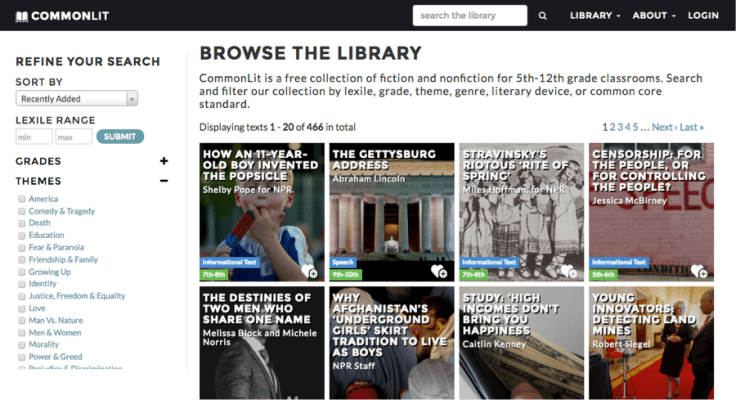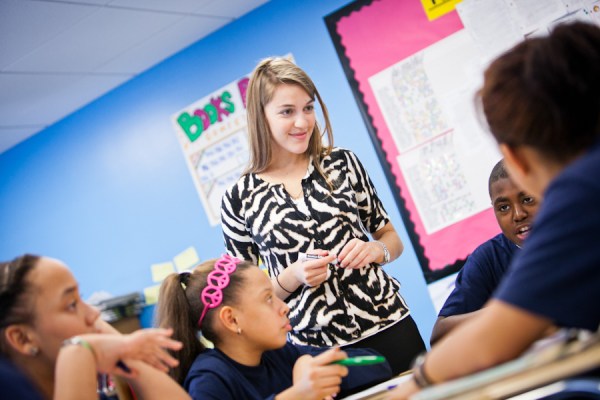A tech nonprofit called CommonLit won a $3.89 million grant from the Department of Education to develop software and content that helps students read well enough to graduate from high school and succeed in their careers or college.
The grant was part of a $26 million initiative by the DOE to support libraries and nonprofits with innovative approaches to literacy.
Here’s how CommonLit works: Educators or families can set up an account and give students a code to log into CommonLit.org. There, students get reading assignments and quizzes that adapt to their reading levels over time.
Teachers can track the progress of a class or individual learner, grade their work and see where they are most challenged.
Content for CommonLit lessons is donated by publishers and authors, and encompasses short works or passages from fiction, non-fiction and poetry.

The CommonLit.org digital library.
Contributors to CommonLit have included individual authors like Rita Dove, Billy Collins, Amy Tan and Gary Soto, and institutions like the Society for Science and the Public, NPR and the Digital Public Library of America.
Plenty of other edtech companies offer schools and learners from grades 5 through 12 tools to develop and test their reading skills.
Companies on this mission include large educational publishers like McGraw-Hill, with its Learn Smart and Smart Book programs, Renaissance Learning’s Accelerated Reader platform and venture-backed startups like Newsela or ActivelyLearn, to name just a few.
But what’s different about CommonLit, said chief executive and founder Michelle Brown, is that it makes its software and content completely free to schools, families and students that want to use it.
And CommonLit allows users to print materials, which matters most to students who simply don’t have enough computer or smartphone time to complete all their reading assignments online.
According to Education Superhighway, an organization that studies internet availability and speeds in U.S. schools, 21 million students in the U.S. lack access to high-speed internet.
Founded in 2013, CommonLit also focuses its outreach on schools with the greatest need, but least in financial resources to help students improve their reading mastery. Obviously, for-profit companies like those listed above have to generate profits, so cannot solely focus on schools and students of the greatest need.
Asked whether for-profit companies were seen as competitors, especially those offering “freemium” access to their platforms — where some curriculum and software features are available at zero cost to teachers or end users — Brown said no.
She noted that freemium is a good business model for many, but can contribute to what’s called “the digital divide,” where low-income students and their educational development suffers because they do not have access to tools, from tablets and PCs to individual apps, that are equivalent to those used by peers in wealthier schools or communities.
“We didn’t want to put the best parts of our product behind a paywall. Our goal was to develop a product that promotes higher-order literacy skill, and make it freely accessible so that even teachers in high-needs schools could adopt it,” Brown said.
As of the last week of September, Brown reports, CommonLit had 22,689 registered non-student users, namely teachers, in more than 12,000 schools.
Brown said she intends to use the grant funding over the next two years for hiring, to nearly triple the size of the CommonLit library and to develop year-long planning tools for teachers and a mobile app that works well for schools that have a bring-your-own-device policy.
CommonLit is a graduate of the accelerator for nonprofits, FFWD.org in San Francisco, but is based in Washington, D.C.
